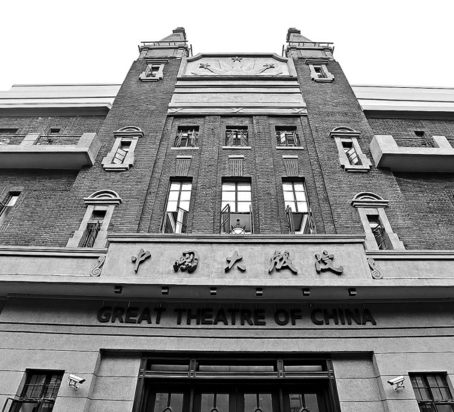MCLC and MCLC Resource Center are pleased to announce publication of “Spoken Drama in the Twenty-First Century: Li Liuyi’s Sichuan-dialect Adaptation of Teahouse,” by Megan Ammirati. The essay appears below, but to read it with its accompanying videos, you should go to: https://u.osu.edu/mclc/online-series/ammirati/.
Kirk A. Denton
Editor, MCLC
By Megan Ammirati
MCLC Resource Center Publication (Copyright March 2019)

Figure 1: The set of Li Liuyi’s production of Lao She’s Teahouse in Nanjing, 2018
Lao She’s 老舍 Teahouse (茶馆) is one of the most representative works of modern Chinese drama. An epic history spanning the first half of the twentieth century, the play narrates the compromises that Wang Lifa 王利法, the proprietor of a teahouse, makes in order to survive the late Qing reform movement, the death of the would-be-emperor Yuan Shikai, and the War of Resistance. The play’s canonization has been reinforced in academic and artistic circles, anthologies in Chinese and English, as well as domestic and international productions. While the script certainly merits such a reputation, the play’s lengthy history on stage has been much more contentious.
The production history of Teahouse reflects the fluctuations in China’s political climate. The script was published to general acclaim in 1957, when the relatively liberal atmosphere of the Hundred Flowers Movement allowed for some of Lao She’s more critical perspectives on Chinese history. However, when Jiao Juyin 焦菊隐 and the Beijing People’s Art Theatre (北京人民艺术剧院) produced Teahouse in 1958, they were subject to the harsh criticisms typical of the new Anti-Rightist and Great Leap Forward movements. The Beijing People’s Art Theatre produced the play a second time in 1963, but the dominant literary policy was promoting a focus on the first thirteen years of the PRC rather than pre-Liberation history (Yu 2013: 107-108). The theatre did not produce the play again until 1979, after the end of the Cultural Revolution and the deaths of both its playwright and original director. This production preserved Jiao Juyin’s original designs and cast a large number of leading actors in their original roles (Chen 2010: 16-17). More than a nostalgic tribute, these staging decisions redoubled the commitment to the original production and its practitioners. Since then, most professional productions of Teahouse have stayed true to the Beijing People’s Art Theatre’s original staging, making similar choices about costumes, set designs, and acting style. When the famously innovative director Lin Zhaohua 林兆华 revived the play in 1990, he confessed that his respect for the script and its history had made him reluctant to make drastic changes (Yu 2013: 112). Continue reading →





 This year at Fudan University in Shanghai, there will not be any students talking loudly about female genitalia. Zhihe Society 知和社, an on-campus student organization committed to addressing gender issues, was forced to cancel its annual performance of the feminist play The Vagina Monologues (阴道独白 yīndào dúbái), which was set to take place on May 31.
This year at Fudan University in Shanghai, there will not be any students talking loudly about female genitalia. Zhihe Society 知和社, an on-campus student organization committed to addressing gender issues, was forced to cancel its annual performance of the feminist play The Vagina Monologues (阴道独白 yīndào dúbái), which was set to take place on May 31.

